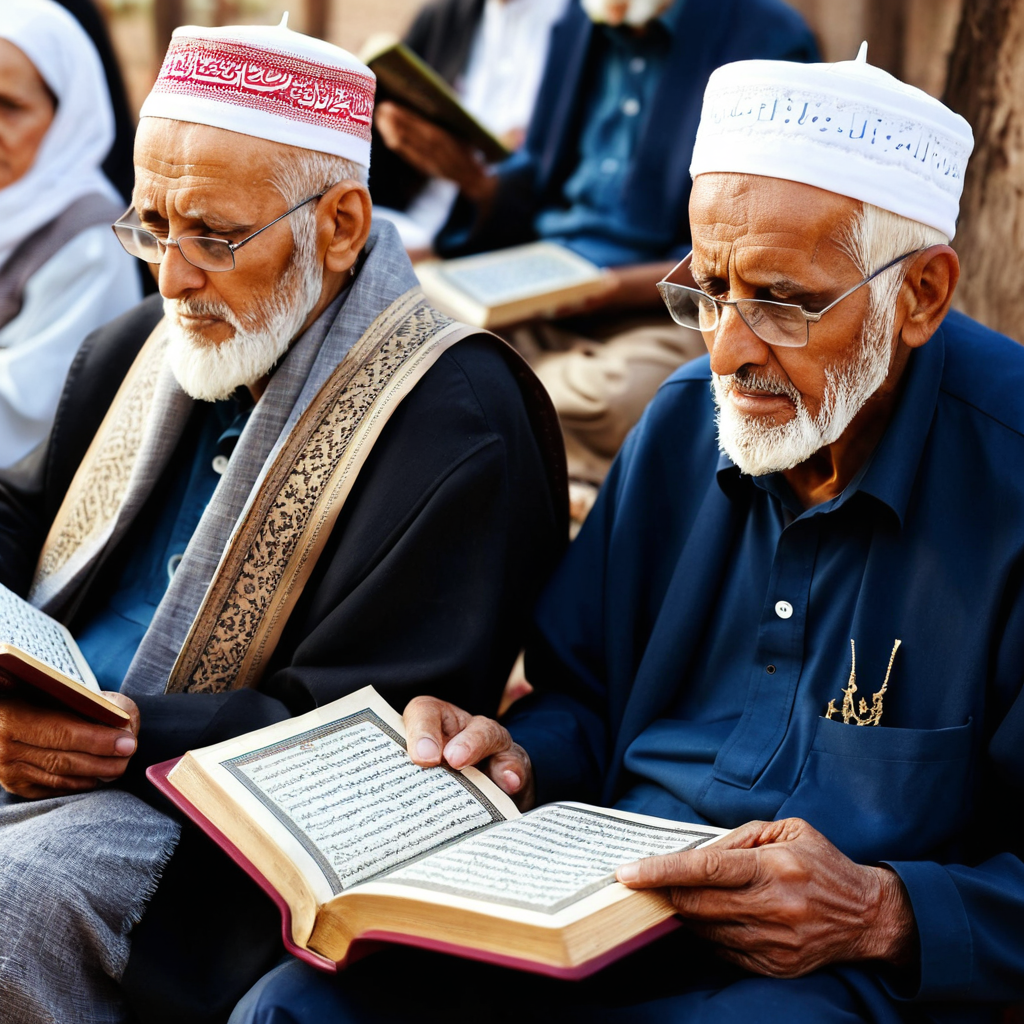
The Quran offers profound insights into life’s purpose, the challenges we face, and the path to eternal success. For Muslims, it serves as a complete guide, shedding light on how to navigate life with wisdom, resilience, and a clear understanding of worldly existence versus the afterlife. This article explores some key Quranic verses that touch upon life’s meaning, the nature of trials, and the pursuit of spiritual growth.
1. The Purpose of Life

The Quran emphasizes that life is not random or meaningless; rather, it has a distinct purpose. Allah created human beings to worship and serve Him, as a way to attain fulfillment and guidance.
وَمَا خَلَقْتُ الْجِنَّ وَالْإِنسَ إِلَّا لِيَعْبُدُونِ
“And I did not create the jinn and mankind except to worship Me.”
(Surah Adh-Dhariyat, 51:56)
This verse reminds us that worshiping Allah and living by His commandments is central to our existence. It encompasses more than just rituals—it means leading a life rooted in kindness, honesty, and justice, reflecting the attributes of a sincere believer.
2. Life as a Test and Temporary Existence

The Quran teaches that worldly life, known as “Dunya,” is temporary and filled with tests that reveal a person’s true character. It is not meant to be an everlasting comfort but rather a trial that prepares us for the afterlife.
كُلُّ نَفْسٍ ذَائِقَةُ الْمَوْتِ ۖ وَنَبْلُوكُمْ بِالشَّرِّ وَالْخَيْرِ فِتْنَةً ۖ وَإِلَيْنَا تُرْجَعُونَ
“Every soul will taste death, and We test you with evil and with good as a trial; and to Us, you will be returned.”
(Surah Al-Anbiya, 21:35)
This verse speaks to the nature of life as a series of tests—both in times of ease and difficulty. Through challenges, we grow spiritually and emotionally, learning patience, gratitude, and resilience.
3. Balancing Worldly Life and the Afterlife
While the Quran advises us not to become attached to worldly possessions, it does encourage a balanced approach to life, ensuring that we do not neglect our worldly duties. The ultimate success lies in the afterlife, so life on earth should be led in preparation for eternity.
وَابْتَغِ فِيمَا آتَاكَ اللَّهُ الدَّارَ الْآخِرَةَ وَلَا تَنسَ نَصِيبَكَ مِنَ الدُّنْيَا وَأَحْسِنْ كَمَا أَحْسَنَ اللَّهُ إِلَيْكَ وَلَا تَبْغِ الْفَسَادَ فِي الْأَرْضِ إِنَّ اللَّهَ لَا يُحِبُّ الْمُفْسِدِينَ
“But seek, through that which Allah has given you, the home of the Hereafter; and yet, do not forget your share of the world. And do good as Allah has done good to you.”
(Surah Al-Qasas, 28:77)
This verse encourages a balanced life where one’s worldly success should complement, rather than distract from, the pursuit of the hereafter. A true believer lives mindfully, investing time in both worldly responsibilities and spiritual growth.
4. Patience and Perseverance in Hardship
Life is filled with trials, but the Quran encourages patience as a means to overcome hardship. Through patience, believers strengthen their faith, gain Allah’s support, and find comfort in His promises.
وَلَنَبْلُوَنَّكُم بِشَيْءٍ مِّنَ الْخَوْفِ وَالْجُوعِ وَنَقْصٍ مِّنَ الْأَمْوَالِ وَالْأَنفُسِ وَالثَّمَرَاتِ ۗ وَبَشِّرِ الصَّابِرِينَ
“And We will surely test you with something of fear and hunger and a loss of wealth and lives and fruits, but give good tidings to the patient.”
(Surah Al-Baqarah, 2:155)
This verse highlights that hardship is part of life’s journey, meant to refine our character. It assures believers that Allah is aware of their struggles and rewards their patience, often in ways they cannot foresee.
5. Gratitude in Every Circumstance
Gratitude is an essential Quranic concept that teaches us to focus on blessings rather than deficiencies. It brings peace, shifts perspective, and strengthens one’s relationship with Allah.
وَإِذْ تَأَذَّنَ رَبُّكُمْ لَئِن شَكَرْتُمْ لَأَزِيدَنَّكُمْ وَلَئِن كَفَرْتُمْ إِنَّ عَذَابِي لَشَدِيدٌ
“If you are grateful, I will surely increase you [in favor].”
(Surah Ibrahim, 14:7)
This verse speaks to the power of gratitude in attracting more blessings. When we recognize Allah’s favors in every circumstance, we open ourselves to a more fulfilling and content life.
6. The Temporary Nature of Worldly Pleasures
The Quran frequently reminds us that worldly pleasures are fleeting, while the afterlife is eternal. It encourages believers not to get too attached to material pursuits but to focus on building a life that will benefit them in the hereafter.
اعْلَمُوا أَنَّمَا الْحَيَاةُ الدُّنْيَا لَعِبٌ وَلَهْوٌ وَزِينَةٌ وَتَفَاخُرٌ بَيْنَكُمْ وَتَكَاثُرٌ فِي الْأَمْوَالِ وَالْأَوْلَادِ ۖ كَمَثَلِ غَيْثٍ أَعْجَبَ الْكُفَّارَ نَبَاتُهُ ثُمَّ يَهِيجُ فَتَرَاهُ مُصْفَرًّا ثُمَّ يَكُونُ حُطَامًا ۖ وَفِي الْآخِرَةِ عَذَابٌ شَدِيدٌ وَمَغْفِرَةٌ مِّنَ اللَّهِ وَرِضْوَانٌ ۚ وَمَا الْحَيَاةُ الدُّنْيَا إِلَّا مَتَاعُ الْغُرُورِ
“Know that the life of this world is but amusement and diversion and adornment and boasting to one another and competition in increase of wealth and children. Like the example of a rain whose [resulting] plant growth pleases the tillers; then it dries, and you see it turned yellow; then it becomes [scattered] debris.”
(Surah Al-Hadid, 57:20)
This verse beautifully captures the impermanence of worldly life, using the metaphor of a crop that blooms, fades, and withers. It reminds us that we should use our time on earth wisely, aiming for eternal success in the hereafter.
7. Striving for Righteousness and Spiritual Growth
The Quran emphasizes continuous self-improvement and striving to become better versions of ourselves. This journey includes helping others, seeking knowledge, and nurturing a close relationship with Allah.
وَالَّذِينَ جَاهَدُوا فِينَا لَنَهْدِيَنَّهُمْ سُبُلَنَا ۖ وَإِنَّ اللَّهَ لَمَعَ الْمُحْسِنِينَ
“And those who strive for Us – We will surely guide them to Our ways. And indeed, Allah is with the doers of good.”
(Surah Al-Ankabut, 29:69)
This verse inspires believers to actively seek Allah’s guidance and to remain committed to righteous actions. As we strive for goodness, Allah promises to guide and support us along the way.
8. Success and Fulfillment in Life According to the Quran

True success, according to the Quran, is not measured by wealth or status but by one’s devotion to Allah and righteousness.
نَّ الْمُسْلِمِينَ وَالْمُسْلِمَاتِ وَالْمُؤْمِنِينَ وَالْمُؤْمِنَاتِ وَالْقَانِتِينَ وَالْقَانِتَاتِ وَالْصَّادِقِينَ وَالْصَّادِقَاتِ وَالْصَّابِرِينَ وَالْصَّابِرَاتِ وَالْخَاشِعِينَ وَالْخَاشِعَاتِ وَالْمُتَصَدِّقِينَ وَالْمُتَصَدِّقَاتِ وَالصَّائِمِينَ وَالصَّائِمَاتِ وَالْمُحْصَنِينَ وَالْمُحْصَنَاتِ وَالذَّاكِرِينَ اللّهَ كَثِيرًا وَالذَّاكِرَاتِ أَعَدَّ اللّهُ لَهُم مَّغْفِرَةً وَأَجْرًا عَظِيمًا
“Whoever does righteousness, whether male or female, while he is a believer – We will surely cause him to live a good life, and We will surely give them their reward [in the Hereafter] according to the best of what they used to do.”
(Surah An-Nahl, 16:97)
This verse emphasizes that a meaningful, fulfilling life comes from living righteously, regardless of one’s circumstances. Believers are promised both a “good life” in this world and the ultimate reward in the hereafter.
9. Life as a Test:

Surah Mulk explicitly mentions that life and death were created as a test to distinguish those who excel in good deeds.
الَّذِي خَلَقَ الْمَوْتَ وَالْحَيَاةَ لِيَبْلُوَكُمْ أَيُّكُمْ أَحْسَنُ عَمَلًا ۖ وَهُوَ الْعَزِيزُ الْغَفُورُ
“He who created death and life to test you as to which of you is best in deed – and He is the Exalted in Might, the Forgiving.”
(Surah Mulk, 67:2)
This verse directly states that life’s purpose is to be a test of character and devotion, encouraging believers to strive for righteous deeds in preparation for the afterlife.
Conclusion
The Quran offers a comprehensive view of life that includes worship, patience, gratitude, balance, and personal growth. By focusing on these principles, believers find guidance for both this world and the next. Life on earth is temporary, filled with trials that prepare us for an eternal abode. Through Quranic teachings, we learn to approach life with a heart aligned with divine wisdom, gaining peace and purpose in our journey.
 Colors
Colors 
 Support
Support 








